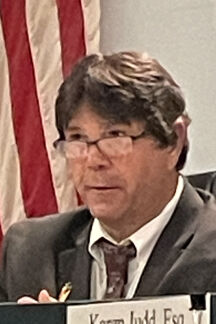
Collins has maintained that the city’s financial health is strong and the budgets are correct and proper. “It’s time to give our property owners a little relief,” Mayor Collins said. The budget presented was only the general fund budget and did not include the water and sewer budget.
Only Ward 4 Council member Ben Lapham had any reaction to the proposed budget Tuesday night. Diana Palmer, in the third ward, said after the meeting that she is taking time to read through all the materials before having a reaction to the mayor’s plan. Lapham and Palmer have had serious concerns about the budget and have been publicly vocal.
At the meeting, Lapham challenged the process, saying, “There’s something wrong with our budget process, because we’re either, A, not really getting down to what the proper revenues were, or B, we’re overstating what our, what our anticipated expenditures would be.” The argument stems from the way in which the two sides see the health of the city’s budget and the use of the budget’s fund balance, which is a sort of savings account for the city. In the final draft budget for 2025, the city was looking to come up about $2.
2 million short, Collins said. Part of what drew the deficit to that level was a recent increase of $381,654 in the senior retiree health insurance costs and part was that the mayor zeroed-out a 2.2% real estate tax hike.
Losing that meant $249,878 was added to the deficit. The total deficit rises to $2.2 million.
The city currently has about $10 million in the fund balance, but that number changes. The mayor wishes to earmark $2.2 million of the fund balance to cover the potential budget shortfall, if the city should need that money.
Collins’ argument, the one he relied on in the latest $25 million budget, is that the city has had these deficits over the past eight years and each time has had such strong revenue and kept expenses down enough that the city has not used the fund balance and has actually added to it. “The numbers show clearly that the City of Glens Falls is fiscally responsible, financially sound and principled. In our plan, I’m confident that at this time next year we’ll be able to report a ninth consecutive year where the assigned reserve has been released,” meaning unused, Collins said during the Common Council meeting.
He argued in an interview that the city used American Rescue Plan Act funding — about $12 million — wisely, using it to fund major upgrades or repairs and to pay for one-time purchases. He admitted that some of that ARPA spending creates longer-term expenses, pointing to parks that were upgraded using ARPA funding but will need continued maintenance into the future. Lapham wondered why the city budgets this way, why create a shortfall in the budget and then wait until year’s end to see if the fund balance is needed.
“It’s interesting to hear the term ‘fiscally responsible’ when we’re saying that every year we’re projecting to take in less money than we spent,” Lapham said, adding that the city must be estimating something wrong and that the city should look more closely at actual spending to come up with better estimates. “We don’t do that. We don’t do any kind of thing about looking at what we’re doing over a long term, projecting things and having that conversation,” Lapham said.
The mayor disagreed in an interview after the board meeting, saying that each city department head comes to the council and talks about each line of the budget, what happened in past year and what is needed in the upcoming year. In past statements and public notices, Palmer sees an inflection point, that the city has relied more recently on American Rescue Plan Act funding to pay for various projects. She agrees with the mayor’s general view of the budget numbers but interprets them differently, she has written.
That is one-time funding but can create long-term expenses. “Our current financial position is, in large part, the result of temporary factors, such as the one-time infusion of $12 million in ARPA funds, and follows a period of tough choices—significant cuts, service consolidation, and the transfer of the Civic Center to the Civic Center Coalition,” she wrote. “Understanding how we arrived here is critical because if we continue on this path without the ARPA cushion, and temporary factors change—a severe winter, an economic downturn, a dip in sales tax revenue, or rising employee benefit and insurance costs—we’re headed for trouble once you factor in the expenses we have to pay,” she wrote.
The public hearing on the budget remains open until the next Common Council meeting, Tuesday Nov. 26 at which time the council is expected to vote on the budget. Other data from the office of the mayor’s press release: Solid sales tax growth: The current financial data shows that City sales tax receipts remain strong – slightly stronger than Warren County as a whole.
Momentum in Economic Development: A dozen small retail businesses have opened in the City’s Downtown core in the past year. Downtown Revitalization Initiative: With new commercial/retail spaces and nearly 100 new apartments, the largest development project that the City has seen in nearly half a century — totaling nearly $50 million in investment — will return multiple properties to the City property tax rolls. Under budget: The City has been consistently under budget for the last eight years, and has carefully managed spending throughout.
.














